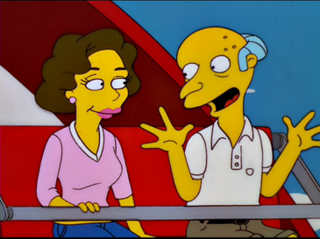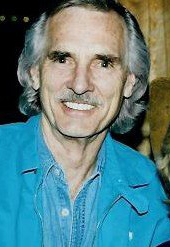
Herschel Shmoikel Pinchas Yerucham Krustofsky, better known by his stage name Krusty the Clown, is a recurring character on the animated television series The Simpsons. He is voiced by Dan Castellaneta. He is the long-time clown host of Bart and Lisa Simpson's favorite TV show, a variety show consisting of various kid-friendly sketches and often highly violent cartoons, most notably The Itchy & Scratchy Show. Despite his cheery onscreen persona, Krusty is actually a cynical, burnt-out, addiction-riddled smoker who is made miserable by show business but continues on anyway. He has become one of the most frequently occurring characters outside the main Simpson family and has been the focus of many episodes, some of which also feature Sideshow Bob.

The Itchy & Scratchy Show is a fictional animated series featured on The Simpsons. The cartoon depicts a sadistic mouse named Itchy who repeatedly maims or murders a black cat named Scratchy. It is typically presented as 15- to 60-second sketches that are a part of The Krusty the Clown Show. Itchy & Scratchy is filled with graphic violence, unsuitable for children, that almost invariably prompts laughter from The Simpsons characters, especially Bart and Lisa.
"Mr. Spritz Goes to Washington" is the fourteenth episode of the fourteenth season of the American animated television series The Simpsons. It originally aired on the Fox network in the United States on March 9, 2003. The episode was written by John Swartzwelder and directed by Lance Kramer.

"Krusty Gets Kancelled" is the twenty-second and final episode of the fourth season of the American animated television series The Simpsons, and the 81st episode overall. It first aired on Fox in the United States on May 13, 1993. In the episode, a new show featuring ventriloquist Arthur Crandall and his dummy Gabbo premieres in Springfield and competes with Krusty the Clown's show. Krusty's show is soon canceled. Bart and Lisa decide to help Krusty get back on the air by staging a comeback special.
"Krusty Gets Busted" is the twelfth and penultimate episode of the first season of the American animated television series The Simpsons. It originally aired on Fox in the United States on April 29, 1990. The episode was written by Jay Kogen and Wallace Wolodarsky and directed by Brad Bird. In the episode, Krusty the Clown is convicted of armed robbery of the Kwik-E-Mart. Believing that Krusty has been framed for it, Bart and Lisa investigate the crime and learn that Krusty's sidekick, Sideshow Bob, is the culprit.

"Tales from the Public Domain" is the fourteenth episode of the thirteenth season of the American animated television series The Simpsons. It originally aired on the Fox network in the United States on March 17, 2002. It is the third trilogy episode of the series, which had become annual since the twelfth season's "Simpsons Tall Tales", consisting of three self-contained segments that are based on historical stories. The first segment, ""D'oh, Brother Where Art Thou?", puts Homer Simpson in the role of Odysseus in the ancient Greek epic poem the Odyssey. The second segment, "Hot Child in the City", tells the story of Joan of Arc, and the third and final segment, "Do the Bard, Man", lampoons William Shakespeare's tragedy Hamlet.
"Homer to the Max" is the thirteenth episode of the tenth season of the American animated television series The Simpsons. It originally aired on Fox in the United States on February 7, 1999. In the episode, Homer discovers that a new television show, Police Cops, has a hero also named Homer Simpson. He is delighted with the positive attention he receives because of his name, but when the television character is rewritten from a hero to a bumbling idiot, he is mocked and taunted, so he changes his name to "Max Power" to rid himself of the negative attention. Max gains new friends, and is forced into a protest to prevent a forest from being knocked down. In the end, he changes his name back to Homer Simpson.
"I Am Furious (Yellow)" is the eighteenth episode of the thirteenth season of the American animated television series The Simpsons. It first aired in the United States by the Fox network on April 28, 2002. In the episode, Bart creates a comic book series based on his father Homer's anger problems, which turns into a popular Internet cartoon series called Angry Dad. Homer finds out and at first is outraged, but after talking to his family, decides to try to become a less angry person.
"Monty Can't Buy Me Love" is the twenty-first episode of the tenth season of the American animated television series The Simpsons. It first aired on Fox in the United States on May 2, 1999. In the episode, Mr. Burns is jealous of megastore owner Arthur Fortune, who is beloved by the people of Springfield. In order to win the people's love, Burns gathers the help of Homer Simpson, Professor Frink and Groundskeeper Willie to capture the Loch Ness monster.
"Large Marge" is the fourth episode of the fourteenth season of the American animated television series The Simpsons. It originally aired on the Fox network in the United States on November 24, 2002. In the episode, Marge decides to get liposuction, thinking that Homer does not find her attractive anymore. However, she accidentally receives breast implants, so she becomes adored by many men in Springfield and becomes a model. Meanwhile, Bart and Milhouse try to imitate a stunt they saw on an episode of Batman that guest starred Krusty the Clown. When the stunt ends badly, media watchdog groups blame Krusty, forcing the clown to make his show more safety-conscious and less fun.

"Homie the Clown" is the fifteenth episode of the sixth season of the American animated television series The Simpsons. It originally aired on Fox in the United States on February 12, 1995. In the episode, Homer becomes a Krusty the Clown impersonator, but is mistaken for the real Krusty by the Springfield Mafia. Joe Mantegna returned as Fat Tony, while Dick Cavett and Johnny Unitas guest starred as themselves.
"Bart Gets an Elephant" is the seventeenth episode of the fifth season of the American animated television series The Simpsons. It originally aired on the Fox network in the United States on March 31, 1994. In this episode, Bart wins a radio contest and is awarded a full-grown African elephant that he names Stampy. After Stampy wrecks the Simpsons' house and eats all the food, Homer decides to sell Stampy to an ivory dealer. Bart runs away with Stampy to save his pet, but the family finds the two at a museum exhibit, where Homer sinks into a tar pit. Homer is saved by Stampy, and so gives the elephant away to an animal refuge instead.

"A Hunka Hunka Burns in Love" is the fourth episode of the thirteenth season of the American animated television series The Simpsons. It first aired on the Fox network on December 2, 2001. In the episode, Mr. Burns falls in love with Gloria, a woman who is much younger than he is and who turns out to be Snake Jailbird's ex-girlfriend.
"The Frying Game" is the twenty-first and penultimate episode of the thirteenth season of the American animated television series The Simpsons. It first aired on the Fox network in the United States on May 19, 2002. In the episode, after accidentally injuring an endangered caterpillar, Homer is sentenced to two weeks of community service. As part of his sentence, Homer delivers Meals on Wheels to an old woman called Mrs. Bellamy, who subtly guilt trips him, and later Marge, into becoming her personal servants. One day, the two find Mrs. Bellamy dead in her house, having been stabbed by a man with braces who quickly escapes the murder scene. Being the only ones present when the police arrive, Homer and Marge are soon suspected for the murder. The episode also features a "Snuh cascade", an homage to a group of Simpsons fans on Usenet.
"The Sweetest Apu" is the nineteenth episode of the thirteenth season of the American animated television series The Simpsons. It originally aired on the Fox network in the United States on May 5, 2002. In the episode, Homer and Marge discover that convenience store owner Apu is having an affair with the Squishee delivery lady working in his store.
"Little Girl in the Big Ten" is the twentieth episode of the thirteenth season of the American animated television series The Simpsons. It originally aired on the Fox network in the United States on May 12, 2002. In the episode, Lisa befriends two college students at a gym and attends college with them. Meanwhile, after being bitten by a mosquito from a Chinese-made toy, Bart is infected with the "panda virus" and is placed in a plastic bubble to prevent others from infection.
"Bart the Fink" is the fifteenth episode of the seventh season of the American animated television series The Simpsons. It originally aired on Fox in the United States on February 11, 1996. In this episode, Bart inadvertently exposes Krusty the Clown as one of the biggest tax cheats in American history. With his career ruined, Krusty fakes his own death and adopts an alias, until Bart and Lisa convince him to become a television clown again.

"Bart Gets Famous" is the twelfth episode of the fifth season of the American animated television series The Simpsons. It originally aired on the Fox network in the United States on February 3, 1994. In the episode, Bart gets a job as Krusty the Clown's production assistant. He replaces Sideshow Mel in one of Krusty's skits and accidentally destroys the stage props. When Bart says "I didn't do it," he instantly becomes famous for his catchphrase.

The fourteenth season of the American animated sitcom The Simpsons aired on Fox from November 3, 2002 to May 18, 2003. The show runner for the fourteenth production season was Al Jean, who executive produced 21 of 22 episodes. The other episode, "How I Spent My Strummer Vacation", was run by Mike Scully. The season was the first to use digital ink-and-paint for most of its episodes, though four episodes were hold-overs from season 13's production run and used traditional ink-and-paint. A fifth season 13 holdover episode, which was the first episode of season 14, used digital ink-and paint like the rest of the season. The fourteenth season has met with mostly positive reviews and won two Primetime Emmy Awards, including Outstanding Animated Program, four Annie Awards and a Writers Guild of America Award. This season contains the show's 300th episode, "Barting Over".

The thirteenth season of the American animated sitcom The Simpsons aired on Fox from November 6, 2001 to May 22, 2002. The showrunner for the thirteenth production season was Al Jean, who executive-produced 17 episodes. Mike Scully executive-produced the remaining five, which were all hold-overs that were produced for the previous season. The Simpsons is an animated series about an American family, which consists of Homer, Marge, Bart, Lisa, and Maggie. The show is set in the fictional city of Springfield, and lampoons American culture, society, television and many aspects of the human condition.










